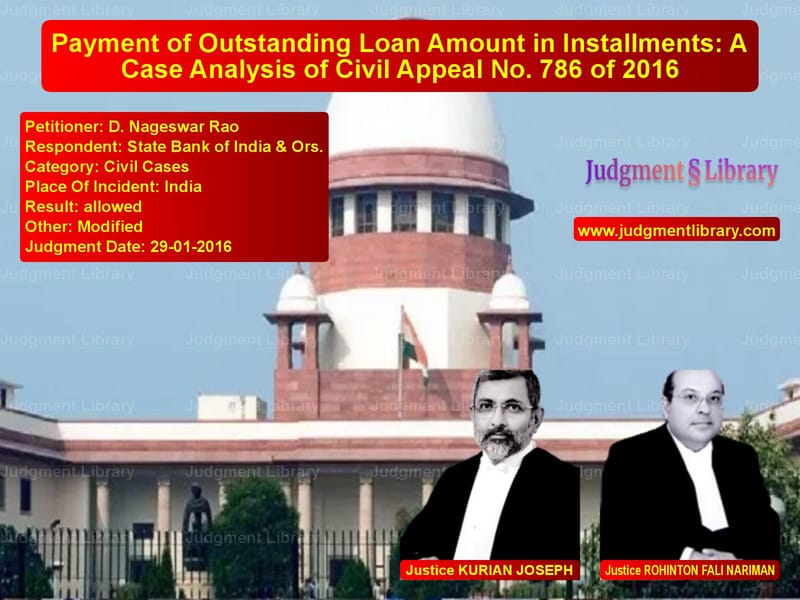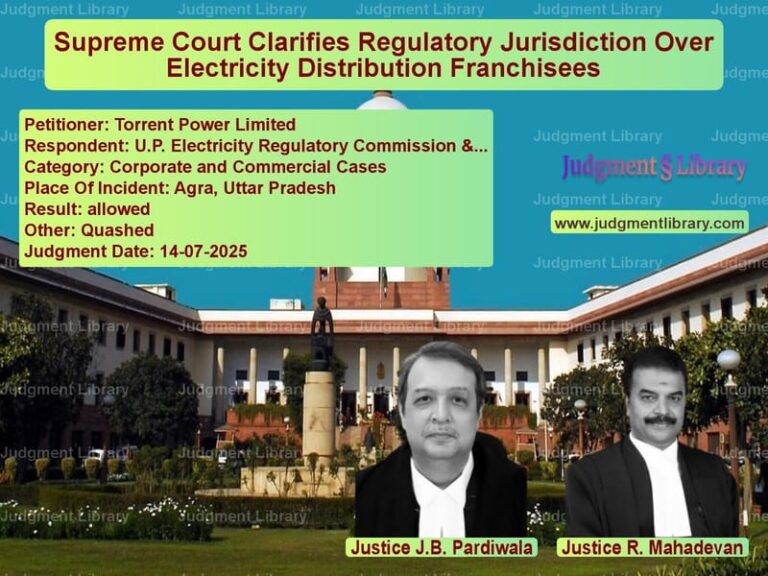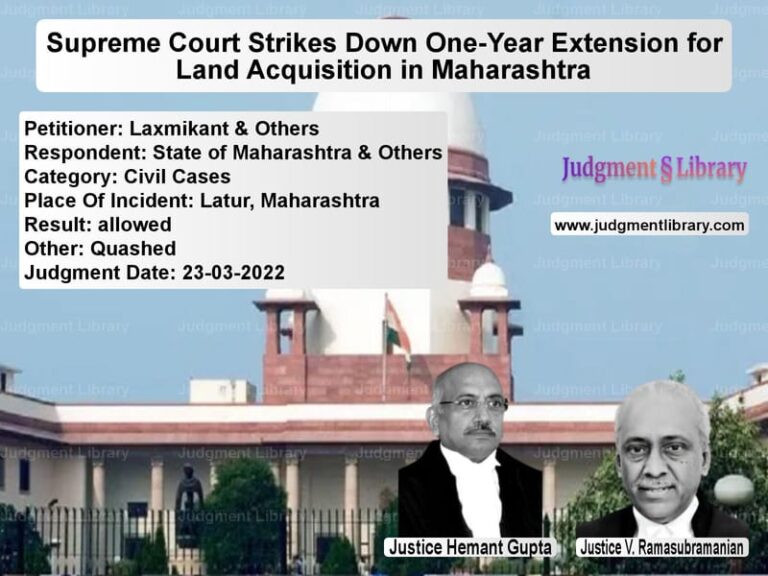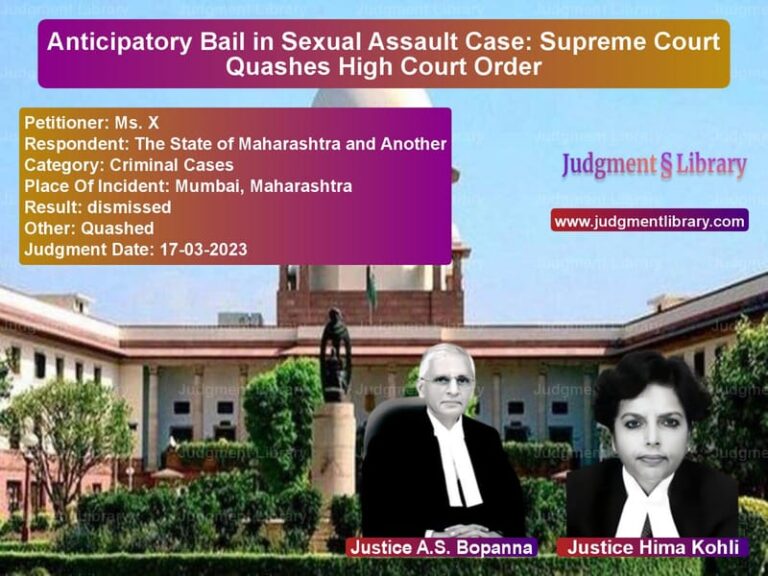Payment of Outstanding Loan Amount in Installments: A Case Analysis of Civil Appeal No. 786 of 2016
The case of D. Nageswar Rao versus State Bank of India & Ors. (Civil Appeal No. 786 of 2016) deals with the issue of repayment of a loan that had been secured by the appellant from the State Bank of India. Due to the appellant’s inability to repay the loan amount, the bank initiated proceedings under The Recovery of Debts Due to Banks and Financial Institutions Act, 1993. The Supreme Court, in its judgment, provided the appellant with one more opportunity to pay the outstanding dues in monthly installments, with specific conditions set for the payment schedule. This case reflects the Court’s approach towards granting indulgence in financial disputes while ensuring the rights of the creditor are upheld.
Background of the Case:
The appellant, D. Nageswar Rao, had taken a loan from the State Bank of India, which he failed to repay within the stipulated time frame. As a result, the bank initiated recovery proceedings under the Debt Recovery Tribunals Act and obtained a decree for Rs. 92,94,183/-. When the appellant could not repay the full amount, the property was put up for auction. Respondent No. 3, the auction purchaser, bought the property for Rs. 48,80,000/-, which was deposited in the Debt Recovery Tribunal’s interest-bearing account. However, after accounting for a prior deposit of Rs. 60,00,000/- made by the appellant, the outstanding dues amounted to Rs. 1,02,06,815/-.
Key Arguments Presented:
Petitioner’s Argument:
The appellant’s counsel argued that the appellant should be allowed to pay the outstanding dues in installments, rather than being forced to pay the entire amount upfront. Given the appellant’s financial situation and past conduct, the counsel requested that the Court grant one final opportunity for repayment in monthly installments. The appellant undertook to pay Rs. 15,00,000/- per month starting from March 2016, as per the proposed schedule.
Respondent’s Argument:
The respondent, represented by the State Bank of India and the auction purchaser (Respondent No. 3), opposed the request for installment payments, citing the appellant’s history of defaults. The bank argued that allowing another opportunity for repayment would be unjust, as the bank had not received the full amount despite the efforts of the auction process. Respondent No. 3 also sought to maintain their position, as they had already deposited the auction amount and were waiting for the outstanding dues to be cleared.
The Court’s Judgment:
The Supreme Court, after considering the arguments from both parties, decided to allow the appellant to repay the outstanding dues in monthly installments of Rs. 15,00,000/-, to be paid by the 5th of every month starting from March 2016. The Court emphasized that if the appellant defaulted on two consecutive installments, the appeal would stand dismissed, and the bank could proceed with the matter in accordance with the law. The Court also directed that the deposit made by Respondent No. 3 would remain with the Debt Recovery Tribunal until the full amount was paid. If the appellant cleared the dues within the given time frame, the appellant would pay Rs. 5,00,000/- as compensation to Respondent No. 3, and the bank would also pay Rs. 5,00,000/- to Respondent No. 3.
The Court concluded that this arrangement was fair and balanced, giving the appellant a final chance to clear the dues while protecting the interests of the bank and the auction purchaser. The appeal was allowed on the condition of adhering to the repayment schedule, with no order as to costs. The appellant was instructed to appear before the Tribunal on the given date to continue the proceedings.
Conclusion:
This judgment highlights the Court’s approach to financial disputes, particularly when a borrower is unable to meet their obligations. By granting the appellant the opportunity to repay the dues in installments, the Court struck a balance between providing relief to the appellant and ensuring that the bank’s interests were protected. The case also reinforces the importance of adhering to court-ordered repayment schedules, with strict consequences for defaults. The Court’s decision underscores the need for fairness in resolving debt recovery matters, ensuring that both parties are treated justly.
Don’t miss out on the full details! Download the complete judgment in PDF format below and gain valuable insights instantly!
Download Judgment: D. Nageswar Rao vs State Bank of India Supreme Court of India Judgment Dated 29-01-2016.pdf
Direct Downlaod Judgment: Direct downlaod this Judgment
See all petitions in Contract Disputes
See all petitions in Debt Recovery
See all petitions in Damages and Compensation
See all petitions in Judgment by Kurian Joseph
See all petitions in allowed
See all petitions in Modified
See all petitions in supreme court of India judgments January 2016
See all petitions in 2016 judgments
See all posts in Civil Cases Category
See all allowed petitions in Civil Cases Category
See all Dismissed petitions in Civil Cases Category
See all partially allowed petitions in Civil Cases Category







